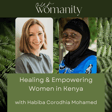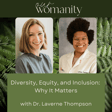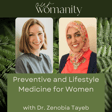
6. Maternal Health and Race with Dr. Fatu Forna
In our new episode of Our Womanity podcast with Dr. Rachel Pope, we're privileged to host Dr. Fatu Forna, Co-Founder of The Mama-Pikin Foundation, dedicated to enhancing maternal health in the US, Sierra Leone and around the world. Dr. Forna, a leading expert in obstetrics, gynecology, and epidemiology, has spearheaded groundbreaking initiatives globally. Her Cocoon Pregnancy Care Model, aimed at improving perinatal outcomes, has garnered widespread acclaim. Beyond her professional achievements, Dr. Forna is a passionate advocate for adolescent reproductive health, authoring essential resources and pioneering educational programs. She has served as Lead for Reproductive and Maternal Health for the World Health Organization in Sierra Leone, as a Medical Epidemiologist at the Centers for Disease Control and Prevention, and as Chief of Women's Services and Physician Program Director for Perinatal Safety and Quality for Kaiser Permanente in Georgia (KPGA).
Beyond her professional endeavors, Dr. Forna is a passionate advocate for the reproductive health of young women. She is the author of "From Your Doctor to You," a crucial resource empowering teenage girls with essential knowledge about their bodies, sexuality, and contraception. Additionally, Dr. Forna has pioneered educational initiatives like the “From your doctor to you: Puberty Party and Manhood/Womanhood Party” curriculum, aimed at fostering healthy conversations around puberty and sexuality.
Dr. Forna's impact extends beyond borders, as she continues to inspire change through her engaging speaking engagements and media appearances. Her commitment to improving the health of women and children has earned her recognition, including features on CNN International.
Join us as she shares her insights on maternal health, race, and the pursuit of equitable healthcare.
Featured in this episode:
- Dr. Fatu Forna TikTok
- Cocoon Pregnancy Care Model
- Why Maternal Death is Increasing in the US
- Health Providers Recognizing the Problem
- Advice for Black Women About to Give Birth
Submit your questions on anything and everything women's health-related and we will answer them in one of our episodes.
Subscribe to our newsletter here to stay updated and not miss out on new episodes.



















